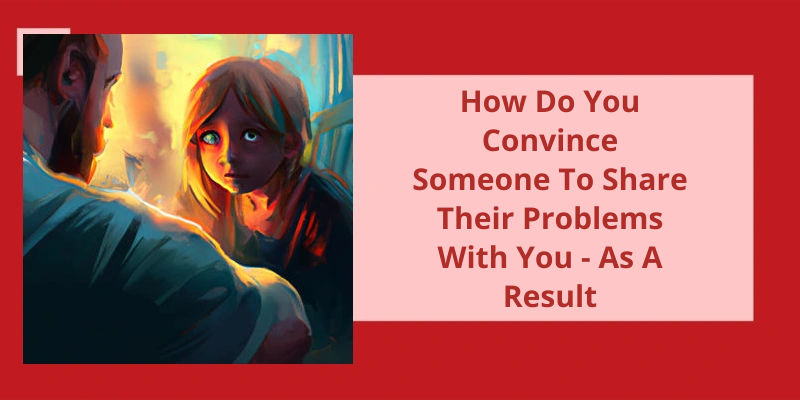It's not easy to be in a relationship. There are many things to consider, from compatibility to commitment. One of the biggest challenges is dealing with the intensity of your partner. You may feel suffocated, trapped, or even scared. Intense behaviour can manifest in a variety of ways – from relentless questioning to constant texting. It's important to recognize the signs of an intense partner and take steps to address the issue. In this article, we'll explore why your boyfriend may be so intense and share some tips for managing the situation. Whether you're in a new relationship or have been with your partner for years, understanding how to deal with intensity can help you build a stronger, healthier connection.
Can a Man Be Too Intense?
However, if we’re talking about an intense man, there’s a possibility that he may be perceived as too aggressive, too emotional, or too overbearing in certain situations. This may very well be seen as a negative trait in some circles, leading to a stigma around men who exhibit intense behavior. Even so, intensity isn’t a universal negative trait, and how men express intensity can depend on several factors, including culture, upbringing, social class, and individual personality.
In certain contexts, men who’re intense may struggle to connect with others on a deeper level, especially if their intensity isn’t channeled effectively. This can be problematic in romantic relationships or friendships for individuals who may feel overwhelmed by the sheer energy level of an intense man. However, with self-awareness and a willingness to understand how their behavior can affect others, men can still learn to manage their intensity and connect with others positively.
An intense man isn’t necessarily bad or wrong. If anything, it shows that he’s a strong sense of purpose and is passionate about achieving his goals. This can be done through mindfulness, self-awareness, and seeking therapy if needed.
The Impact of Intensity on Mental and Emotional Health in Men
- Intense work pressure leading to burnout and stress
- Intense emotional experiences resulting in anxiety and depression
- Intense physical activity leading to exhaustion and fatigue
- Intense social pressure leading to feelings of inadequacy and low self-esteem
- Intense relationships leading to emotional distress and instability
- Intense negative thoughts and behaviors leading to mental health disorders
- Intense trauma leading to PTSD and other emotional disturbances
- Intense medication or substance abuse leading to addiction and other health complications
- Intense spiritual beliefs leading to obsessive thoughts and behaviors
However, being called “intense” by a man can also be a compliment in some cases. It could mean that he’s attracted to your passion, energy, and enthusiasm. So, how can you tell the difference between when being called intense is a positive or negative thing? It all depends on the context and your interactions with this man. Let’s explore this further.
When a Man Calls a Woman Intense?
When a man calls a woman intense, it can be both a compliment and an insult. It all depends on what the man means by it. If he views the woman as someone who’s passionate, driven and focused, then it’s likely a compliment. However, if he sees her as someone who’s aggressive, pushy or overly emotional, then it’s more likely to be an insult.
In general, women are often labelled as “intense” when they don’t conform to traditional gender norms. If a woman is ambitious and assertive, she may be seen as too intense or aggressive. Similarly, if she’s emotional, she may be seen as overly dramatic or unstable. Unfortunately, these stereotypes can limit womens opportunities and undermine their confidence.
If a man is using the word “intense” to describe a woman, it’s important to consider his motivations. Is he trying to put her down or make her feel small? Or is he genuinely impressed by her strength and passion? It’s possible that he simply doesn’t know how to handle a woman who’s different from what hes used to.
Ultimately, it’s up to the woman to decide whether to take the label of “intense” as a compliment or an insult. If she’s proud of her passions and feels that they define her, then she should embrace the label. If, on the other hand, she feels that it’s being used to undermine her, she should confront the man and let him know that she won’t tolerate being labeled in that way.
Whats important is for women to be true to themselves and not conform to narrow stereotypes. Whether theyre loud or quiet, intense or laid back, they should embrace who they’re and not let anyone else define them. And if a man cant handle a strong, passionate woman, then maybe hes not the right one for her anyway.
However, being too intense can also have negative connotations, such as being overbearing or making others uncomfortable. It’s important to understand the balance between passion and moderation in social settings. In this article, we’ll explore the signs and causes of being too intense, as well as tips for managing intensity in relationships and communication.
What Does It Mean When Someone Is Too Intense?
However, being too intense can also indicate a lack of boundaries or an inability to regulate emotions. It can be overwhelming and even off-putting to others, leading to strained relationships and negative consequences. People who’re too intense may struggle to control their behavior, saying or doing things impulsively without considering the impact on those around them. This can cause friction in personal and professional settings, ultimately hindering their own success and fulfillment.
Additionally, being too intense can lead to physical and mental exhaustion, as individuals may struggle to turn off their drive and passions. This can impact their overall well-being and cause burnout. Furthermore, the constant need for stimulation and excitement can drown out other important aspects of life, such as rest and relaxation. This may create a cycle of overworking and undernourishing oneself, leading to a potential decline in overall quality of life.
Furthermore, being too intense can also lead to a lack of authenticity. In an effort to maintain a certain level of intensity, individuals may hide their true thoughts, feelings, or emotions. This can create tension and distance between them and those around them, as others may sense a disconnect or lack of genuine connection. In turn, this can further fuel the need for intensity, as individuals may seek out validation and acceptance through achievements and external factors rather than internal satisfaction and fulfillment.
In order to address being too intense, it’s important to identify the root cause. This may involve exploring past experiences or behaviors that may be contributing to current patterns. Additionally, individuals may benefit from practicing mindfulness and learning to regulate their emotions. This can involve techniques such as deep breathing, visualization, or meditation. Setting clear boundaries and learning to communicate effectively can also help mitigate the negative consequences of being too intense.
Ultimately, being too intense can have both positive and negative implications, depending on the context and individual. It’s important to recognize the potential drawbacks and work towards finding balance and fulfillment in all areas of life. By acknowledging and addressing intensity, individuals can cultivate healthier relationships, improve overall well-being, and achieve their goals in a sustainable and authentic way.
How Being Too Intense Can Impact Personal Relationships
Excessive intensity can negatively affect personal relationships by overwhelming individuals with intense emotions and making them feel uncomfortable. When a person becomes too intense, they may become demanding or clingy, leaving their partner feeling stressed and not wanting to be around them. Over time, this can lead to relationship problems and even a breakup. Therefore, it’s important to maintain a healthy balance and not become obsessively intense in a relationship.
Recognizing when a relationship has become too intense can be a difficult thing to do. However, being aware of certain signs and behaviors can help you identify whether your partner is coming on too strong. Intensity in a relationship can be flattering, but if your partner’s actions start to feel overwhelming, it might be time to reassess the situation. So, how do you know if your relationship is becoming too intense? Here are some warning signs to look out for.
How Do You Know if a Relationship Is Too Intense?
It can also mean that the other person isn’t respecting your boundaries and is overly possessive or jealous. You might feel suffocated or like you cant breathe in the relationship. Additionally, if you feel like you cant take time for yourself or that youre unable to spend time with friends and family, it could be a sign that the intensity level is too high.
Another indicator that a relationship is too intense is if theres a lack of balance or if one person is doing all the work to keep things going. If youre always the one initiating contact or planning outings, and your partner seems to be passive or unwilling to put in effort, that could be a red flag. Conversely, if your partner is always trying to plan your time together without consulting you or respecting your schedule, that could mean theyre disregarding your autonomy and trying to control your life.
Emotional intensity can also become unhealthy if it’s based on insecurity or an urgent need for validation. If your partner is constantly seeking reassurance or needing you to prove your love for them, it can be exhausting and emotionally draining. It’s important to build a relationship on trust, respect, and mutual support, rather than on a constant need for approval or validation.
Physical intimacy can also be a sign of an intense relationship, and it’s important to ensure that both partners are comfortable and willing to engage in this aspect of the relationship. If one person is pushing for more sexual activity or seems to be using sex as a way to control the other person, that can be a sign of an unhealthy power dynamic. It’s crucial to communicate openly and honestly about your boundaries, desires, and needs in this area, and to ensure that both parties feel safe and respected.
Maintaining a healthy and fulfilling relationship requires effort, especially when one partner becomes emotionally intense or reactive. Expert advice suggests a few key strategies to deal with an intense boyfriend, including grounding yourself before responding, communicating openly, understanding your relationship dynamics, and setting boundaries. Let’s take a closer look at these strategies below.
How Do You Deal With an Intense Boyfriend?
Dealing with an intense boyfriend can be overwhelming and emotionally draining. If you’re constantly walking on eggshells around them and worrying about how they’ll react to situations, it can be difficult to maintain a healthy relationship. However, experts suggest that there are certain techniques you can use to manage your partners emotional reactivity.
One of the most important things you can do is take a brief moment to ground yourself before responding. When your partner is yelling, screaming, or otherwise behaving in an aggressive or hostile way, it can be easy to get sucked into the chaos. However, taking a deep breath, focusing on your own body, and reminding yourself that you aren’t responsible for your partners emotions can help you stay calm and centered.
When you do respond, it’s important to communicate how you feel and focus on the impact of your partners behavior. Instead of attacking or blaming them, try to express your own emotions in a constructive way. For example, you might say something like, “When you yell at me, I feel scared and hurt,” rather than, “Youre always so angry and mean!”
It can also be helpful to try to understand your relationship dynamic and why your partner may be reacting so intensely to certain situations. Are there particular triggers that set them off? Do they’ve unresolved trauma or experiences that are exacerbating their emotional reactivity? Understanding these underlying factors can help you approach your partner with empathy and compassion.
Setting boundaries for yourself is also crucial when dealing with an intense partner. This might mean establishing clear rules about what behavior is acceptable and what’s not, or simply taking time apart when things become too overwhelming. Ultimately, you need to prioritize your own emotional well-being and recognize that you aren’t responsible for managing your partners emotions.
In some cases, it may also be necessary to seek professional help or counseling to address the underlying issues behind your partners emotional reactivity. This can be a difficult step, but it may ultimately be necessary to maintain a healthy and sustainable relationship.
By using grounding techniques, communicating compassionately, setting clear boundaries, and seeking help when needed, you can navigate this challenging dynamic and build a strong, supportive, and healthy relationship.
Tips on How to Support Your Boyfriend in Seeking Help for His Emotions
- Encourage him to express his feelings and let him know that it’s okay to not feel okay.
- Offer to listen without judgment or interruption.
- Suggest seeking professional help, such as therapy or counseling.
- Research and provide resources for mental health support.
- Offer to accompany him to appointments or support groups.
- Regularly check in on his wellbeing and ask how he’s feeling.
- Avoid minimizing or dismissing his emotions.
- Encourage self-care activities, such as exercise, meditation, or hobbies.
- Acknowledge his achievements and progress in seeking help.
- Remind him that asking for help is a sign of strength, not weakness.
When a relationship becomes too intense, it’s important to take steps to manage your emotions and maintain your well-being. Rather than solely focusing on the intensity of the relationship, consider finding positive outlets like volunteering, making art, or joining a cause. Additionally, removing lifestyle choices that exacerbate the intensity, practicing mindfulness, and seeking support can all play important roles in managing intense emotions.
What to Do When a Relationship Is Too Intense?
When a relationship becomes too intense, it can feel overwhelming and suffocating. It’s important to take a step back and find ways to channel that intensity into a positive outlet. Rather than depending on your relationship to fulfill all of your emotional needs, try to find other ways to express yourself. This could be through volunteering, making art, or joining a cause that you care about. By doing so, you can channel that energy into something productive, while also allowing yourself to develop your own individual identity.
It’s also important to recognize that emotions aren’t bad in and of themselves. Rather than suppressing your emotions, find healthy ways to express them. This could mean journaling or talking to a trusted friend or therapist. By getting your emotions out and processing them in a healthy way, you can prevent them from building up and causing even more intensity in your relationship.
In addition, it’s important to remove any lifestyle choices that may be exacerbating the intensity in your relationship. This could mean cutting back on substances like alcohol or drugs, or making changes to your routine to reduce stress and anxiety. By removing these negative influences, you can create a healthier foundation for your relationship and prevent further intensity from building up.
Mindfulness can also be a useful tool for managing intense emotions in a relationship. By practicing mindfulness, you can learn to observe your thoughts and feelings without reacting to them. This can help you develop a greater sense of self-awareness and emotional regulation, which can be incredibly helpful when navigating intense emotions in a relationship.
Finally, seeking support from trusted friends, family members, or a therapist can be an important step in managing the intensity of a relationship. By talking through your feelings with someone who understands and supports you, you can gain perspective and find ways to move forward in a healthy and productive way. Remember, it’s okay to take a step back and prioritize your own emotional well-being. By doing so, you can create a healthier foundation for your relationship and prevent intensity from becoming overwhelming.
Signs to Watch Out for When a Relationship Is Becoming Too Intense
When a relationship becomes too intense, it’s important to be aware of the signs. These may include a lack of personal space or privacy, constant attention and need for reassurance, emotional dependence, and an inability to communicate effectively. Other red flags may include excessive jealousy, controlling behavior, and an escalation of arguments or conflicts. If you notice any of these signs in your relationship, it’s important to address them with your partner and seek support if needed.
Conclusion
In conclusion, if you feel like your boyfriend is too intense, it's important to address the issue head-on. Don't let your discomfort go unacknowledged, as it may only lead to further problems down the line. A healthy relationship is one where both partners feel comfortable, respected, and valued, and if your boyfriend's actions are causing you to feel otherwise, you owe it to yourself to take action. Open communication, setting boundaries, and seeking outside help (such as from a therapist or counselor) can all be effective ways to address intense behavior in a relationship. Remember, you deserve to feel safe and happy in your romantic partnerships, and there’s nothing wrong with advocating for your own needs and preferences.






